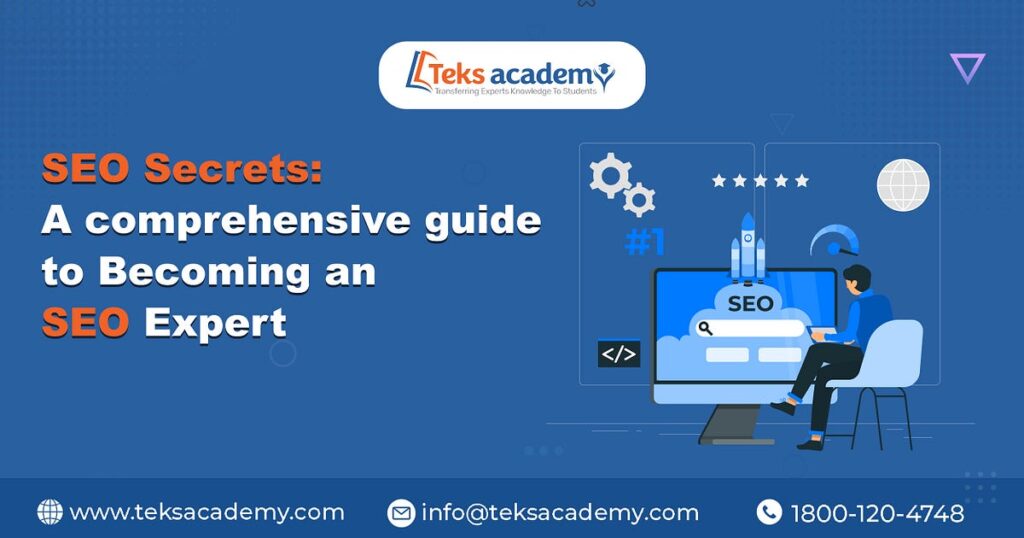When you type any word on Google, it shows millions of websites on the page in seconds. You get the best relevant results on the first three to four links on the Google page. Have you ever thought of how these relevant websites pop up on the first page when we type words on the search bar? Have you ever thought of why other websites do not come on the first page? What is the secret behind this sequence of websites placed in order?
The world of digital marketing has many secrets and keeps changing all the time. Very few succeed in digital marketing, while others get lost in the ocean of social media content and influence. Have you heard about Search Engine Optimization which is called SEO in short? SEO plays a major role in placing the website or helps to increase the traffic of the website or to reach the audience. This blog shows you the best way to become an expert in SEO which is essential in the digital marketing industry.
What is meant by SEO?
Search Engine Optimization is one of the best practices to improve the appearance and visibility of web pages. SEO optimization also helps to improve the website’s speed and easy navigation inside a webpage.
The better your website visibility on the search page, the more chances for an increase in the traffic of your website. The major goal of search engine optimization is to make the visitors reach your website or help convert customers into clients or audiences.
Why is SEO important?
SEO does not give results overnight. You need to be consistent for a good response from the audience for your website, blog, articles, or any content you post on the internet. Most of the users click on the top 5 links on a Google page that is the reason you should use SEO to place the website on the top 5 links of the search engine page.
Note: Google is not a website – It is a search engine where users go to websites based on the keywords they type in.
The usage of SEO optimization gives a better user experience on the website. A website is trusted by the user based on the appearance on the top of the Google page based on the research. So SEO plays a crucial role in placing websites in the top positions.
SEO is more helpful for promotion of the websites. Users who find websites on the top of the search page promote them more frequently on social media. SEO is also more helpful in selling products online to increase business.

Different types of Search Engine Optimization:
Optimizing the search engine is not a simplified process. It should be done on a consistent basis. One cannot do one-time optimization and leave the website or any content as it is. It requires constant assessment of the response from the audience. To simplify the SEO process it is classified into three types.
- On-page SEO.
- Off-page SEO.
- Technical SEO.
On-page SEO:
On-page SEO is the practice of making changes to your website and content to make it more visible to the audience and friendly to the search engine.
The main idea of on-page SEO is to provide search engine crawlers with sufficient signals to understand the meaning and idea of your content.
Search engines cannot read a page as we do. They look for keyword signals to detect the context of the page. You will work on the website structure, keywords, optimization of headings, image SEO, and internal links to make the crawlers identify your content.
Off-page SEO:
The other way to make your website rank higher on the SERP is by using off-page SEO. Off-page SEO is otherwise known as link building. When a user searches for websites using keywords, the search engine algorithms find the best pages based on the intent of the user.
The websites that are SEO optimized appear on top of the search page. The other main factor that determines the position of the webpage is the number of backlinks.
Backlinks create more trust among the users depending on the source it has created. Backlinks are nothing but clickable link that will redirect to another blog or website.
Technical SEO:
Technical Search Engine Optimization refers to the optimization strategies and techniques that focus on improving the technical side of a website to make it more visible and perform better in search engines. It is different from traditional or “on-page” SEO, which focuses on optimizing text and keywords. Instead, technical SEO looks at how a website works and how it is coded.
Some important parts of technical SEO are optimizing the speed of a website, making sure it works well on mobile devices, improving crawling. And also indexing, optimizing XML sitemaps, fixing broken links and redirects, using structured data markup, and optimizing a website’s design.
By using best practices for technical SEO, websites can improve their users’ general experience, make it faster for pages to load. Also make it easier for search engines to understand and index their content. This can lead to better rankings in organic search results and more traffic from organic search.
Local SEO:
Local search engine optimization is the process of optimizing a website to increase visibility and rankings on local search results. You can ask what are local search results.
When the audience from a specific geographic location searches for a particular content based on the keywords, the website appears on the SERP page with the relevant results which are known as local search results. Local SEO is essential for business people who provide services in a specific location. A list of activities followed in local SEO are:
- Usage of local keywords.
- Optimizing Google my business listings.
- Local citations.
- Online reviews from customers.
Research and Keyword analysis:
Researching appropriate keywords is an essential component of effective Search Engine Optimization operations. Learn how to identify keywords that are relevant to the content of your website. Also learn high-ranking keywords that align with your target demographics. Make use of the various tools available for keyword research in order to investigate the search volume, the level of competition, and the long-tail keyword opportunities. If you understand the user intent, you will be able to optimize your content so that it can be successfully matched to search queries.
Content creation and optimization:
In Search Engine Optimization, it’s very important to make content that is useful, original, and interesting. Create a content plan that fits the interests and needs of your target audience. Optimize your text by using the right keywords, headings, and links within it. Add things like pictures and videos to make the user’s experience better. Update and refresh your material often to keep it up-to-date and to keep your search engine rankings.
Learn to track and analyze data:
If you want to become an expert at search engine optimization, you need to measure and examine how well your SEO efforts are working. Using tools like Google Analytics and Adobe Analytics, you can keep track of important data like organic traffic, bounce rates, conversion rates, and keyword results. Based on this data, decide how to change your SEO strategy so you can find problem areas and improve your site’s general performance.
SEO expert’s salary range:
In India, SEO experts get a salary ranging from 2 LPA at the beginning level to 5 LPA at the senior level. Listed below is the salary range an SEO expert will get based on their experience.
| Experience level | Salary range ( Per Annum) |
| < 1 yr | Rs. 1, 97,000 – 2, 00,000 |
| 1-4 yrs | Rs. 2,70,000 – 3,10,000 |
| 5-9 yrs | Rs. 4,50,000 – 4,86,000 |
| 10-12 yrs | Rs. 5,00,000 – 5,30,000 |
In conclusion:
Search Engine Optimization is one of the digital marketing basics you may come across in your learning process. Do you know SEO is one of the best performance marketing strategies that helps any website rank higher on the search engine results page? By learning all the above-listed strategies, you will become an expert in a very short span of time. To learn more about SEO and the keywords that perform better on a website or in content, there are various keyword tool applications available. Use them to learn more about the workings of SEO and become an expert in the world of search engine optimization.







